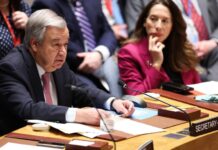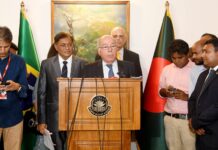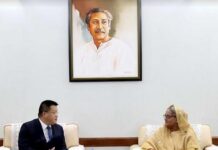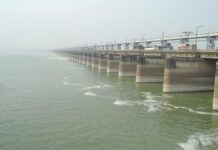Shaporan Haque:
Bangladesh has achieved unimaginable success in various fields of sustainable development in recent years. Despite many challenges, Bangladesh has successfully passed important global milestones such as LDC graduation. However, amid all these achievements, Bangladesh has to face multiple challenges related to climate change. In the meantime, the adverse effects of climate change on human life and livelihoods have become more challenging, along with the Covid-19 pandemic. One of the main reasons for reduced climate-related allocations in the proposed budget for 2021-22 is the present Covid-19 pandemic situation. The significant increase in post-Covid-19 economic recovery allocation also has a role behind this decline. But in reality, this claim is inconsistent.
This year National Budget for the fiscal year 2021-22 placed before the parliament just two days before World Environment Day. On the day, the government has also published the separate climate budget report for the fifth time. To address the impacts of climate change and mitigation, the Ministry of Finance has issued Climate Financing for Sustainable Development: Budget Report since FY 2017-18.
Climate finance Report shows that the cumulative budget allocation of these twenty-five Ministries/Divisions accounts for 57.33 percent of the total national budget of FY 2021-22 totaled Tk 346,106.40 crore. Of this, the climate-relevant operational budget is 7.28 percent or Tk 25,124.98 crore. The climate-relevant allocation has been consistently low in the previous three financial years. In the fiscal year 2021-22, the total climate-related budget of these ministries is 31.02 percent which is about 12.19 crore less than the outgoing financial year.
Although FY 2021-22 budget was declared as the budget to protect life and livelihood, there is no specific instruction in the budget on the economic measures to address the challenges of climate change to face the coronavirus pandemic. Here is nothing on preventing the deteriorating situation of the environment. Like in the past, the environment and climate sectors have been neglected that is frustrating, environmentalists said. Although Bangladesh has become increasingly prone to disasters due to global warming and climate change, the climate-related allocations in the national budget reduced rather than increasing.

From the fiscal year, 2016-17 to 2021-22, the climate change-related allocation rate is decreasing though the total budget allocation increased in terms of the value of Taka. In the financial year 2017-18, the total climate-related allocation was 8.01 percent (Tk 18,929.43 crore) of the total budget. In the next financial year, the total climate-related allocation was 8.1 percent (Tk 21,430.8 crore) of the total budget. In the fiscal year 2019-20, the total climate-related allocation was 7.74 percent (Tk. 23,538.32 crore) of the total. And in the fiscal year 2020-21 ends in last June, the total climate-related allocation was 7.48 percent (Tk 24,075.69 crore) of the total budget.
Talking about the climate-related allocation in National Budget 2021-22, Climate Finance and Environment Analyst and Executive Director of Change Initiative M Zakir Hossain Khan said that the climate-related allocation has been declining year by year. However, despite the continuous reduction of climate change-related allocation in terms of Taka in the national budget, the amount of climate-related expenditure is increasing to carry out various measures taken to tackle climate change. Even the government makes a macro allocation that couldn’t possibly spend properly at the community level. It is time to focus on sustainable climate finance. We need to initiate proper projects efficiently to address the adverse effects of climate change through research. We need to research the risks we face in tackling the problems caused by climate change. We need to test our competencies before taking any project and go for implementation. On the other hand, it should not be related to only taking projects but we also have to involve related people at the community level. We need to engage the local youth in these projects. Community involvement should be increased so that they can make the maximum contribution. We have to look at this issue seriously. Without complying with any specific criteria, Climate-related allocations have been made in various sectors in a scattered way. To improve this situation, a timely strategic plan for climate financing has to be adopted targeting 2030.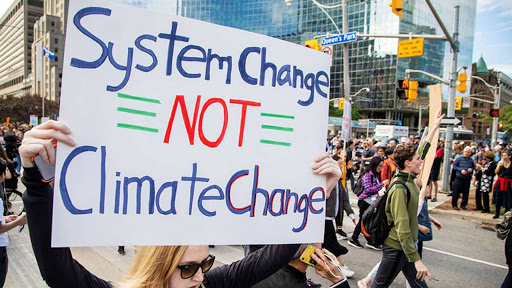
To address the adverse effects of climate change, Climate Financing for Sustainable Development: Budget Report 2021-22 states that the government is committed to financing six major planning and funding. Of these, the Country Investment Plan for the Environment, Forests and Climate Change (CIP-EFCC) has been estimated that the total cost will be US$11.7 billion of which 40 percent has already been financed by the government and contributions from the development partners. A financing gap to the tune of US$7 billion of the total cost of CIP still exists. For the proper implementation of Nationally Determined Contribution (NDC), a two-fold strategy against climate change impacts, activities need a total of Tk 3,52,800 Crore from 2015 to 2030 which amounted to Tk 23,520 crore annually. However, from the financial year 2015-16 till now, only 34.91 percent of the total required funds have been allocated under the adaptation program implementation.
Meanwhile, a total of Tk 3,752 crore has been allocated to the Bangladesh Climate Change Trust Fund (BCCTF) for the implementation of the climate change agenda in the public-private sector till FY 2020-21. From FY 2020-21, the estimated total expenditure on climate-related projects under Bangladesh Delta Plan 2100 has been increased to Tk. 1,913,574 million from Tk. 30,66,230 million. Whether it is not clear if any new projects got the allocation in the financial year 2021-22. So far, US$167.3 million allocations were approved for four climate change-related projects under the Green Climate Fund (GCF). Of this, US$94.7 million funds came as grants and US$72.6 million as government co-financing.
In most cases, a culture of neglecting environmental sensitivities in implementing government development projects developed without taking them into proper justification. The Climate advocacy platform represents 18 voluntary organizations Network on Climate Change, Bangladesh (NCC’B) is conducting various activities to tackle climate change. Research and Advocacy Manager of NCC’B Dr. Muhammed Forruq Rahman said that Bangladesh needs GDP’s one percent allocation every year to tackle climate change. Reducing the operational expenditure, at least 10 percent expenditure should be increased by every year in the development sector. Emphasizing the importance of fundraising and proper use of Climate Change Fund, he urged to form a National Climate Commission reshuffling Climate Change Trust Act, 2010 under the leadership of the Prime Minister comprising representatives of private and civil society to ensure transparency, accountability, and efficiency in climate finance and integrated climate financing with the annual development plan under this commission.
According to the Global Climate Risk Index 2021, Bangladesh is the seventh most vulnerable country to climate change in the last 20 years after 1999. Although Bangladesh ranked 162nd in the Environmental Performance Index (EPI), there is no significant progress seen in budget allocations for environmental improvement. As Bangladesh is politically committed to tackling natural disasters caused by climate change, most of the climate change projects of the country brought benefits to the involved people in many cases. In the existing context of the unforeseen pandemic of Covid-19, it is time to take effective and expeditious steps that allocations made on a priority basis for people who faced a greater risk of climate change and justified international climate change allocations in days to come.
The writer is a Communications Professional and Freelance Journalist. He can be reached at s[email protected]


